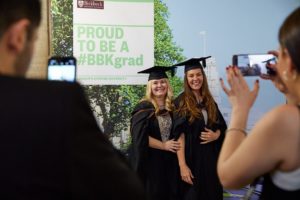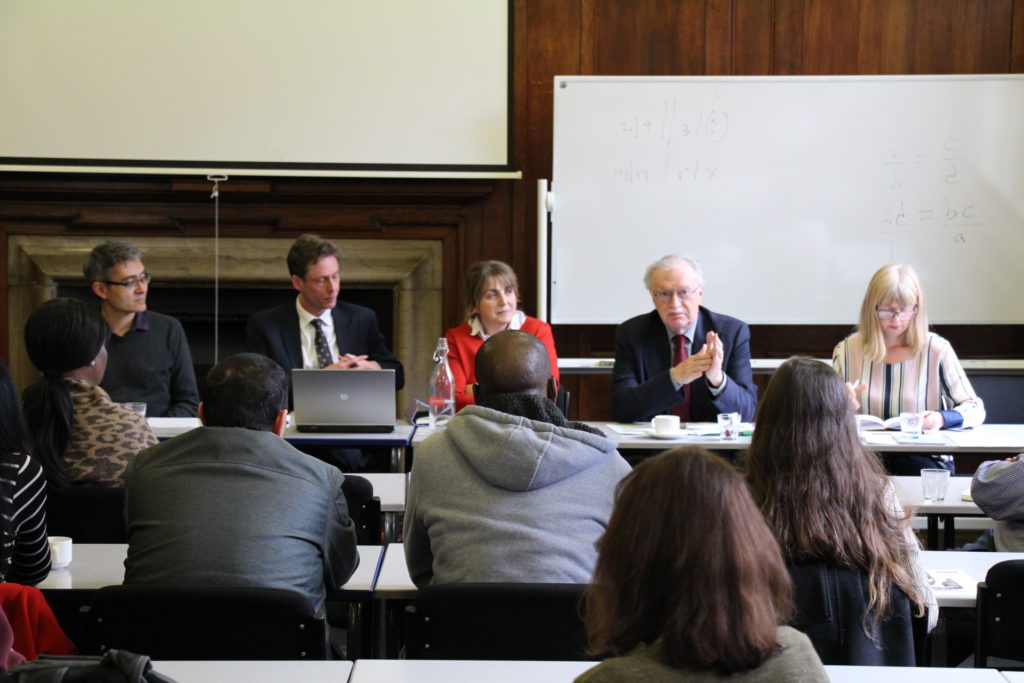Dr Ben Winyard, Senior Content Editor, discusses the recent Man Booker event at Birkbeck, which saw author Julian Barnes in conversation with Russell Celyn Jones, Professor of Creative Writing.

On 27 November 2017, prize-winning novelist, essayist, journalist, memoirist and art critic Julian Barnes came to Birkbeck for the annual Man Booker at Birkbeck event. Hundreds of Birkbeck students, alumni and staff – including many from Birkbeck’s popular and successful creative writing programmes – attended the event, while 2000 free copies of Barnes’s Man Booker Prize-winning novel, The Sense of an Ending (2011), were distributed in the weeks beforehand. This is the seventh year of this ongoing, hugely successful initiative between Birkbeck and the Man Booker Foundation and, as Hilary Fraser, Executive Dean of the School of Arts, observed in her introduction, both institutions are committed to ‘the public good’ of bringing the highest cultural and intellectual achievements, including the very best of contemporary literature, to the widest possible audience.
In a genial, urbane and erudite exchange, Russell Celyn Jones, Professor of Creative Writing at Birkbeck, discussed The Sense of an Ending with Barnes, interrogating him about the novel’s genesis, central concerns and themes, and readers’ responses. The Sense of an Ending is a meditation on the pleasures and perils of ageing, the slipperiness of memory, the contingency of identity, and the sting of remorse. It is narrated in the first-person by Tony Webster, an affable, very British everyman, who has happily – perhaps even smugly – sailed through life with as little friction and emotional upset as possible. In the first part of the novel, we are treated to Tony’s blandly straightforward memories of his sixth-form and university days, as the repressed 1960s begin to sputter into life with the falling away of old prohibitions. In a bravura middle section, Barnes glosses over four decades of Tony’s very ordinary life in just five paragraphs, emphasising the swift passage of time and the terse eulogy of a man who has lived entirely according to his own fixed self-image as a ‘regular, reliable, honest chap’, in Barnes’s words. In the second half of the novel, Tony’s life is upended by revelations about the death by suicide, forty years previously, of his precociously brilliant school friend, Adrian, and the return to his life of his acerbic first girlfriend, Veronica.
In a tussle over ownership of Adrian’s lost diary, Tony endures a series of baffling, bruising encounters with an indignant Veronica, whose constant refrain is, ‘You don’t get it, but then you never did’. The recovery of a half-remembered letter he sent Adrian in a fit of pique overturns his quietism, revealing a moment of youthful callousness that belies his lifelong self-image as an amiable, decent and morally equitable person. Tony is also confronted with uncomfortable truths about a child secretly fathered by Adrian, forcing him to reassess his memories and unleashing an irremediable, guilty sense of responsibility for contributing to Adrian’s suicidal despair. We might regard Tony as ‘cowardly’, Barnes observed, or as ‘emotionally practical’, but he is less an unreliable narrator than a narrator who simply gets things wrong.
Barnes located the origins of the novel in his 2008 memoir, Nothing to be Frightened of, which explored his own intense fear of dying and death. While writing this piece, he shared with his philosopher brother a memory of their grandfather slaughtering chickens, which his brother remembered so differently as to present Barnes with two alternative, ‘incompatible’ memories. This powered his interest in the precariousness of memory, which has profound implications for our sense of self, but also for the writing of history more generally. In the novel’s early scenes, the young Adrian quotes a historian invented by Barnes – whom some readers have fruitlessly Googled and even quoted as if he were real – who argues, ‘History is that certainty produced at the point where the imperfections of memory meet the inadequacies of documentation.’ The Sense of an Ending is thus shot through with concerns about causation, memory and the writing of personal and national histories. This ‘comic beginning’ to the novel was accompanied by the personal discovery of the death by suicide of a brilliant school friend many years before, which encouraged Barnes to explore in fiction how we can think of the dead as alive and fantasise about their unlived lives.
Barnes admitted that he liked wielding the authorial tool of a hidden secret, enlisting the reader as a detective or a historian, who must piece together events from Tony’s unreliable memories. Barnes also confessed to enjoying inflicting a correctional revelation on his complacent narrator, unearthing his buried, youthful capacity for ‘great emotional violence’, as well as delivering a shock to the reader, who has taken Tony at his word and understood him as essentially mild. Through Tony, Barnes explores how our memories, which can feel utterly truthful and foundational to our sense of self, can be sanitised, redacted and preserved in mental aspic. Barnes confessed that he shares Veronica’s punitiveness, as we come to understand the profoundly damaging effect Tony’s blithe letter had on her. ‘Remorse’, Barnes expounded, has its etymology in Latin and originally meant ‘to bite again’, and it is through the sharpness of his regret that Tony comes to a deeper understanding of himself, his history and his actions.
Barnes discussed his own belief that our character is largely fixed in childhood and the illusoriness of our adolescent sense that our life ‘as free philosophical individuals’ will fully begin when we become adults. In distinction to existential philosophy, which emphasises individual freedom and action and which Barnes’s young characters affectedly adopt, Barnes argues that ‘your room for manoeuvre in your life is smaller than you think’ – as Tony painfully learns. An audience member remarked on Tony’s retreat into the mundane when confronted with uncomfortable truths – he instigates a hilariously petty discussion about thick-cut chips in a pub when he realises that he has met Adrian’s now-grown son – and Barnes revealed his own preoccupation, at a dear friend’s funeral, with the architectural history of the church in which the service was taking place. Grief, he argued, ‘is not as it is written down’ because ‘we oscillate between different levels’ and our grief is rarely unmixed with other emotions, responses and thoughts.
In reply to questions from creative writing students, Barnes confirmed his abiding interest in form and discussed the ‘technical challenge’ of a novel in which the bulk of a person’s life is hastily summarised and the emphasis is rather on the bookends to Tony’s existence – his youthful education, followed by his retirement. The authorial ability to move a narrative through time is something Barnes feels becomes stronger with age. For Barnes, form encompasses style, design and viewpoint and he quoted Flaubert’s observation that form needs an idea – and vice versa. For Barnes, when these two elements – form and idea – cross, there is a ‘fizz’, like electricity passing along a wire. Barnes insisted on the centrality of truth-telling to the art of fiction, arguing that it encompasses and expresses complex ‘truths [that] can’t be reduced to bullet-points or Christmas cracker mottos.’ Although he is an accomplished critic of art, Barnes argued that the novel, with its unique depth and intimacy, cannot be supplanted by other art forms.
The audience was interested in the film adaptation of the novel – ‘Take the money and run!’ was Barnes’s droll advice – Barnes’s influences, readerly responses to Tony, what Barnes is currently reading and his interest in translated literature. This successful, enjoyable evening confirmed yet again that Birkbeck and the Man Booker Foundation are a natural fit, with both offering multiple opportunities for cultural exchange, intellectual advancement and literary enjoyment.







